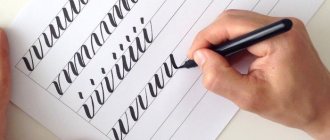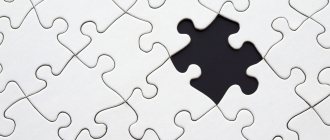Hello everyone, dear readers! Lyudmila Redkina is in touch. How often have you had to float your brain during a lecture or while talking to someone? No, not when you don’t understand the topic of conversation at all. Namely when you make every effort to concentrate? Have you ever experienced a situation where you read the same news on Instagram or Facebook and catch yourself thinking about something completely different? Perhaps you didn’t notice the “Give Way” sign or by chance you survived crossing the road when it was red? Today we’ll talk about how to develop attention and what you need to do to achieve this.
What is attention and what properties does it have?
In psychology, attention is understood as the ability to select and concentrate on stimuli that attract us for some reason. We select information consciously or unconsciously, process it, while at the same time ignoring other information.
Such selection, ignoring unnecessary things and processing is one cognitive process - attention. It helps us not to become overwhelmed by the amount of information we absorb, not to become frostbitten from what is important, and, accordingly, to react to our processing.
And I’ll immediately give an example to make it clear. You're getting ready for work and listening to the radio in the background. In addition to the songs, weather reports slipped through. And you focused your attention on them: it will rain today, which means you need to take an umbrella. The cognitive process helped you by ignoring it not to clog your brain with songs, select useful information about the rain and react accordingly - take an umbrella to work.
Our mental process of selecting information is divided into types:
- Involuntary - when we unconsciously pay attention to flowers, advertising, pictures, people, etc.
- Voluntary - we consciously direct attention to the selection of information, for example, while studying or during an important conversation.
- Post-voluntary – when a person first forced himself to pay attention, and then he became interested and no longer needed to specifically hold it.
This process also has the following properties:
- distribution,
- switchability,
- sustainability,
- concentration,
- volume,
- speed,
- intensity.
Read more about this classification in the article Types of attention in humans.
Concentrate on one task
A lot of people try to do several things at the same time, but it doesn’t work that way. You simply switch your attention, but in any case it will be superficial, given that it takes at least 15 minutes for a person to be fully immersed in the work process.
The harm of multitasking has been scientifically proven. Thus, studies have been conducted which have found that talking on the phone or with a passenger while driving increases the likelihood of an accident. However, this is obvious. So why do we get distracted when we are doing other things?
One of the main reasons is boredom. If something is not interesting, then we want to make it more fun. But attention suffers from this, and we also wean ourselves from concentrating on boring things. This is why we can, for example, during important but boring business negotiations, simply stop listening to our partner and fly away with a profitable deal worth millions of dollars. It's just that no one wants to deal with a person who doesn't understand their thoughts.
It is very useful for concentration to think in advance what you will do and strictly follow this plan. Another reason why we are inattentive is the subjective feeling of the difficulty of the task. It is much easier to focus on simple tasks. Therefore, we need to break down any complex task into a huge number of simple ones and in each unit of time be focused on a simple task.
The same technique will help you overcome laziness and start doing what you don’t want to do. Willpower and the ability to voluntarily control your attention are one and the same thing. For example, I don’t want to write a thesis. If you even sit down to use it, you will notice that very quickly your eyes will be directed towards social networks. This is not surprising, since you have not reduced what you consider a difficult task to simple actions.
However, there is no need to describe the matter to the smallest detail. This is too intellectually expensive a task. Just ask yourself the question: “What is the most basic action I can take right now that can move me towards my goal.” And ask yourself this question more often, because this way you focus on a specific simple action.
Over time, you won't have boring things to do. You know the saying: “Appetite comes with eating”? The main thing is to start taking small, elementary steps that do not require willpower. And then you get carried away.
You can combine this advice with the previous one. Let's take the same diploma as an example. Your actions to improve concentration will be as follows:
- Do you think: “What is the simplest thing you can do to write a thesis”? An idea comes to your mind, for example, that it is easiest to turn on the computer.
- We pressed the computer's power button and sat down. Here you can pause to put your thoughts in order. It is recommended to do this, even if everything is fine. Sometimes it can only be an illusion.
- Every time you feel that your thoughts are starting to get confused, take a short break. Just pay attention, we don’t do anything during this break. We just let the brain digest the information that it received while writing the thesis.
- After a break, you again ask the question: “What is the simplest thing you can do?”
After some time, this style of work will become automatic. Only here it is important to follow the rule: “Either we work or we do nothing.” Rest is needed for more efficient work, and not for encouraging laziness, remember your priorities.
Another technique close to this one. If you don’t want to sit down to work, then the simplest action would be to do absolutely nothing. Really try, through an effort of will, to forbid yourself to do anything other than lie idle. In the near future you will get tired of this, and it will be much easier to force yourself to work with concentration.
Another good recommendation is to have a St. Sloth Day for yourself. You just don’t do anything on this day. We guarantee quality rest and work-related withdrawal. And as a result – perseverance in the future.
Why develop attention
The process of information selection is very closely related to other cognitive processes. For example, it cannot exist without memory. More precisely, memory without it. If there is no selection of information, there will be no specific memorization - about everything and nothing. That is why many students who have problems with academic performance need to develop their attention, not their memory through poetry.
Not only memory depends on concentration, but also thinking, perception, and speech. This is understandable - we plunged into the depths of the brain. But in practice, why do we need to develop it?
- Increase work efficiency - if you are distracted by everything and everyone, then you are unlikely to do your serious work, and this is already a disadvantage for you as an employee.
- Moving up the career ladder follows from the first point. When distraction goes away, then your career will go up + for leading positions you must learn to quickly switch attention from one thing to another.
- Attentive driving - any driver, by the will of fate, must keep his attention on the road, his life and that of other people depends on it.
- Doing several things at the same time is generally an extremely necessary skill of the 21st century; you will have a very hard time if you do not learn how to do it.
Inattention dooms you to failure: redoing work, reducing the respect of others for you, danger on the road and a huge number of all sorts of problems.
Soooo, what should we do about it now? We learned what attention is and figured out why we desperately need it. And how to get it - so important and necessary?
When our attention is disrupted
If you periodically have problems with attention, don’t worry, this is common to all normal people. We want to embrace everything that happens in us and around us, and it is quite natural that this does not always work out. In addition, factors such as insomnia, fatigue, and prolonged overexertion can interfere with the concentration of our thoughts. But they do not last long, they take a short time. If they last longer, then a certain type of disorder is present:
- Absent-mindedness. With weak concentration, an involuntary, easy switching of human attention occurs. This is more common among preschoolers and elementary school students. There is everything in their head, but not the main thing.
- Absent-mindedness of scientists. Pundits, as a rule, concentrate their attention on something specific, their teaching, science. They are not able to quickly switch to other things.
- Absent-mindedness is age-related. Old people suffer from this disease; they forget everything and are unable to concentrate on specific positions. The cause is age-related diseases, problems with memory, and brain activity.
- The attention span is reduced due to other significant factors and events. People in moments of grief or great happiness can be absent-minded and inattentive.
- Attention fatigue – occurs due to depletion of concentration when working on a specific task for a long time.
If brain diseases are present, a person may develop serious problems with concentration and other, more complex diseases.
Tips for developing mindfulness
I warn you right away that in response to some advice you will say: “By, we already knew that!” So if you knew, why don’t you do it all the time?! Attention needs to be protected and developed; this is a very capricious process of our brain. The situation will change a little abruptly - we have already lost him.
Concentration
A lot of research has been done on the topic of concentration, there are special tests for attention and determining the level of concentration. And the authors agree that the following tips will definitely improve this property:
- Walk in nature - walking restores nervous processes. In nature there are fewer irritants that distract a person. While walking, you can think about something important and restore your mental and physical strength.
- Immerse yourself in your favorite activity - it helps develop concentration. Choose a time when no one will disturb you. Sometimes it’s difficult, but even if you devote 30 minutes to what you love, it will already have its result.
- Read interesting books - reading, in general, has become a curiosity for the “gadget” generation. So now every second person suffers from concentration. Read, my dears, so that you don’t feel ashamed of your lost concentration.
Sustainability
This property helps us keep our attention in suspense until the end of the task. Remember when we were writing a dictation at school, we literally crawled out of the office because we were incredibly tired. Why? Because they kept our resilience and concentration under strain. And this, I tell you, is a huge effort of the brain, especially for a child.
Resilience can be developed in the following ways:
- Reading – it will be mentioned often today. The problem is that reading is one of the main factors in the development of attention. Sustainability is achieved through long reading.
- Observation - in the park or in the yard, select an object and watch it for 15-20 minutes, just follow it with your eyes, examine it.
Switchability
The speed of transition from one activity to another is the key to a manager’s success, we have already talked about this. Have you seen an absent-minded person? So this is the absence or low switchability of attention. How to develop it:
- In the house, try to do as many different things as possible in an hour. It's not even a matter of execution speed. It is important that these tasks be different in nature: wash the dishes, read 1 news, cook scrambled eggs, do a warm-up, talk on the phone for 5 minutes, watch TV at the same time, and then tell yourself what they were talking about and what they were watching.
- On the street, look at what a passerby is wearing, what brand of car was driving, how many cracks are on the asphalt ahead, etc.
Distribution
A person's ability to hold several different objects in attention. This is very clearly visible from drivers: hold the brake pedal, depress the clutch, turn the steering wheel, watch the situation on the road and talk about nuclear physics, for example.
- Take a piece of paper, two pens and write your first and last name with both hands at the same time.
- Say the numbers 1 to 20 out loud while writing them in reverse order on the sheet.
- Draw different geometric shapes in the air with both hands at the same time.
Volume
This is the ability of a person to focus on several objects simultaneously in a split second. On average, for adults it is 4–6 objects. But in children it is 1-2. So they need to increase the volume. To do this, the distribution is first trained. Then the child is given tasks like:
- look at the toy (at your level), how many light bulbs are on the chandelier;
- look at the sentence, how many letters A and K are in it, etc.
Top ways to develop your mindfulness
To start developing your attentiveness, it is better to first take a test that will show whether you are actually unable to concentrate, or whether it is just an attitude you received from childhood. It is quite possible that everything is fine with you, but your parents, “out of good intentions,” constantly reminded you that you “messed up something, as always,” or that you are as absent-minded as the hero of Marshak’s poem . By the way, absent-mindedness may just indicate that a person is completely absorbed in some difficult mental task on which he is currently concentrated. It is enough just to remember such a stamp as socks or shoes of different colors on the feet of... a scientist!
It turns out that mindfulness is also a relative concept. A student who looks out the window can count all the birds on the tree there or say exactly how many television antennas are on the roof of the opposite house, how many cats usually walk on it, and what color they are. At the same time, he is absolutely not concentrated on what the teacher is explaining. However, this is a reason to check how interesting the teacher is giving the lesson, rather than attributing inattention to the student.
If you are still skeptical about your ability to selectively perceive reality, then you need to work on yourself. And this can be done with the help of special exercises and games. And this is not drilling yourself, but quite interesting and exciting activities.
Today, the top ways to develop mindfulness include:
- special computer games;
- entertaining games like “Find 10 differences”;
- exercises to remember details of the environment or people’s appearance;
- listening to previously unfamiliar songs and trying to remember the words;
- training in transferring concentration from external stimuli to work and vice versa.
Test with answers for attentiveness and logic
To understand how carefully you perceive information, you can try to answer the test questions. You need to choose the correct answer from those given.
1. The doctor prescribed Vasily to take four tablets, every half hour. He gave the first one to the patient right in the office. When will Vasily stop taking these pills?
- a) in an hour;
- b) in an hour and a half;
- c) in two hours.
2. The total age of the two brothers is 11 years. The age difference is 10 years. How old are both brothers?
- a) 1 year and 10 years;
- b) six months and 10.5 years;
- c) 1 year and 11 years.
3. How many months in a year have 28 days?
- a) 6;
- b) 12;
- in 1.
4. A plane flying from country A to country B crashed. Where will plane crash survivors be buried?
- a) in the country over which the accident occurred;
- b) neither in A nor in B;
- c) everyone in their homeland.
5. What kind of milk do kittens like best?
- a) cow;
- b) cat;
- c) milk mixture.
Answers
The correct answers are hidden under the letter “b”. If you chose these answers in most cases, then you can be congratulated for your good attention. If you were more often inclined to answer “c,” then you are trying to approach questions meaningfully, but you still need to work on your logic of thinking. If most of the answers were under the letter “a,” then most likely you did not think about the task at all.
Detailed analysis
1.
If Vasily took a pill in the doctor’s office, then he will take the next one in half an hour, the third in an hour, and the last one in an hour and a half.
2.
If the older brother was 10 years old, and the younger brother was one year old, then they would have a difference of not 10, but 9 years. If the eldest was 11 years old and the youngest was one year old, then together they would be 12 years old. So the option remains: six months + 10.5 years.
3.
There is a 28th day in every month.
4.
If people survived the accident, then why bury them?
5.
Cats are mammals, which means cat milk exists. This is what suits kittens best, and they love it more than the milk of other animals.
Special games will help you become more attentive
The same computer solitaire games that secretaries are usually criticized for are good games for attentiveness and logic. Another thing is that you shouldn’t do them at the expense of your main job. And if you also need to develop a reaction, then arcade games are perfect, simple in plot, but not allowing you to be distracted. Examples could be Zuma or Tetris, Bubbles or Arkanoid. When you need to develop attention to detail, then “shooting games” and “adventure games” will come to the rescue. This will also be facilitated by various simulators of driving a car, an airplane, a locomotive, or even an intergalactic spaceship.
If you already have to spend a lot of time in front of the monitor, then you can train your attentiveness in your free time using Sudoku, Japanese crossword puzzles or other logical problems that are published in newspapers and magazines. Entire collections of interesting tasks are also published, which are difficult for even an adult to cope with.
At the peak of popularity, such entertainment as quests in reality is also at the peak of popularity. This is where you need to apply both attention and intelligence to solving problems! And you can't say that it's boring.
Riddles and attentiveness tasks
Attention is not only the memorization of visual images, it is also the perception of information by ear. Since ancient times, different peoples have had riddles, using which they tested not only wit, but auditory memory, as well as the ability to perceive various details by ear. This is exactly the case when you can’t ignore anything if you want to give the correct answer.
For example, this riddle:
“A flock was flying. Quite small. How many birds were there, and what were they like?!”
Of course, we can say that it has no solution, but if the person guessing it slightly softens the sound “m” in the word “absolutely”, and even plays it up with intonation, then this is what will happen:
A small flock of seven owls was flying.
How many birds were there, and what were they?
Answer: seven owls.
Or this problem with a trick:
“There is a casket under the water, there are 33 pearls in it. The sticky fish liked them, and she stole all but 12. How many pearls were left in the casket?
An inattentive person will indulge in arithmetic and begin to subtract 12 from 33. But it was precisely 12 pearls that remained in the casket, since the fish was unable to capture them.
Exercises
There are several simple exercises that will help you effectively select the necessary information in a short time. They can be done at any time at home.
- Concentrate your gaze on the tip of your finger, try to hold your attention for 3-4 minutes. It's not as simple as it may seem!
- Try to switch your attention to natural objects: look closely at a fallen leaf, then at the sand, then at the swaying of a branch, a stone or a pebble on the sea.
- “Green dot method” - take a sheet of printed text and place a bold green dot in the center. Every day for 1-2 months, look at it before going to bed for 10 minutes. Try to distract yourself from everything that interferes, throw away your thoughts. Then quickly lie down. This develops concentration and ignoring unnecessary information.
- Transferring concentration from one object to another helps relieve fatigue and nourish our attention - start with a small detail, then consider what’s around it, then expand your concentration, then narrow it. The result will be a kind of gymnastics for attention.
- Listen to the noise around you for 10 minutes. Try to differentiate it: this is the sea, this is a bird singing, this is the radio playing, this is the wind humming, this is a child talking. This is how you develop auditory attention. And it can be difficult to keep him on one object.
- In a newspaper or magazine, cross out all the letters E.
- In 15 seconds, try to find round or red objects around you.
In addition to such exercises, I would like to present you with cool interactive exercises that develop at any age.
- Effective exercises for training concentration and attention span – 4brain
Here are described effective exercises that help develop this mental process.
- High-impact brain training with over 30 targeted exercises – NeuroNation
These are free exercises that train different properties of your attention. To participate in the program, you need to fill out a form with your data and receive an email with a link for free access.
- Attention exercises – Happymozg
Here are some interesting exercises that will help improve your concentration skills. There are 5 exercises available:
- Secret materials.
- Private investigator.
- Dance with fireflies.
- Catch the ladybug.
- Chest.
The exercises are interesting for children and adults. They help you concentrate and select the necessary information from the background.
What influences a person's attention?
In general, there is a rational grain in comparing attention with a muscle. But it is worth considering that this mental process does not work in isolation. In psychology, attention cannot be considered separately, and emotions, for example, cannot be considered separately. If you're feeling scared right now, it's okay to take a break from the work you're doing. And so with all processes.
Therefore, first you need to determine the root cause of inattention and eliminate it, not the symptom. In general, the described metaphor needs to be “continued.” The quality of attention also depends on other “muscles” that exist in our psyche.
Games
Helps improve the process of selecting game information. These can be computer games or on the phone, as well as joint children's games for schoolchildren or preschoolers in kindergarten.
On the logiclike website you will find 15 games for developing children's attention. Here you can choose ages 5–8, 9–14 years and from 15. After choosing a class, you will see starting blocks. After completing them, you will begin more complex games. You can go through them yourself or with your child.
Games for children on the “Let's Play” website - you need to find, mark or avoid something. Children will have a lot of fun going through the mazes and finding the differences.
Games for attention
How to respond to distractions?
You will still be distracted, that's normal. Everything here is the same as during meditation. You noticed that you started using social networks – you focused on the simplest action for your goal or task, then on one more. At the same time, you try to follow the rule described above: “Either work or do nothing.”
Try to introduce the meditative principle in everything you do. What it is? This is precisely focusing on the simplest thing in your task. This habit should manifest itself even in such basic things as brushing your teeth. Just watch how the hand moves from one side to the other. We got distracted and returned to the starting point. Yes, this will also be meditation.
Yes, the example of brushing your teeth may even seem funny. But meditation is any voluntary (that is, with your active participation) direction of attention with its further adjustment in case of distraction. If you follow the meditative principle, after a while you will completely forget about inattention. But not immediately, but as this skill develops.
Exercise equipment
There are very successful simulators that help you train your mental processes and achieve good results.
On BrainApps you will find 18 useful exercise machines.
For example, on the Concentration simulator you need to select the locations of identical pictures. It helps:
- improve concentration;
- increase memory and attention.
In the Schulte Table simulator, you need to select numbers from 1 to 25 and mark them. This training gives the following results:
- development of attention stability;
- voluntary perception improves;
- the volume of information selection increases.
Simulators for the development of attention
On the Vikium site there are 46 simulators for the development of this mental process. Here are some of them:
- Gemini - here switching, concentration and selectivity are trained in a playful way. You need to select the “Gemini” icon from all the zodiac signs presented.
- Remember the order - here you need to carefully look at which cell the number appears in, remember and repeat. Memory, concentration and attention span are trained. The brain learns to process incoming information, group it and structure it.
Attention training on Vikium
How to improve attention with special pictures
And yet, a person receives 90% of information through vision. That is why so much attention is paid to pictures to train the ability to concentrate.
Find 10 differences:
Find 3 differences in the photo:
In addition to paired pictures with a certain number of differences, there are other test options:
- tasks to find as many similar objects as possible in the picture, for example, vases, snowflakes, butterflies or dogs;
- pictures that allow you to see a 3D image from a certain angle;
- numbers enclosed in various geometric figures, written scatteredly, which must be found all in order;
- complex labyrinths drawn on paper from which you need to find a way out;
- a drawing of the room where the crime occurred, in which you need to find as much evidence as possible, the number of which is known in advance.
A picture is often available to us for a long time, but there are tests in which the picture is given only for a certain number of seconds or minutes, and during this time we need to remember the location and number of objects, as well as name them.
Courses
To learn something, you need to turn to a person who already knows how to do it. To develop your cognitive processes, you need to learn ready-made effective programs. There are excellent attention courses that will effectively improve your skills.
Development of attention from Vikium is an online course that consists of 15 lessons, includes 11 simulators and audio materials to calm the nervous system. At the moment, its cost has decreased to 1,490 rubles. instead of 2,490 rub.
What you will get after training:
- Increased concentration and speed of switching attention.
- Ability to effectively focus on tasks.
- You will be able to improve control over your own activities.
- You will be able to forget about absent-mindedness and minor mistakes forever.
The course for developing attention from Brian Apps is 7 interesting lessons, 10 simulators, you are offered introductory and final tests to view the dynamics, an adaptive program for you.
What does training provide:
- Increased performance through concentration.
- Quickly switch from one activity to another.
- Prolonged concentration on one object.
- Working with large amounts of information.
- Focus on a few objects.
- Bringing all started tasks to completion.
The price for training is now 490 rubles.
Meditate
Nothing can help you understand how to develop mindfulness better than meditation. This is the easiest way to develop this quality. It works in several directions at once:
- Helps you get rid of stress and digest thoughts that interfere with productive work.
- It trains concentration, because during meditation a person needs to try to focus on some object for a long time (meditation masters can watch their breathing for hours).
- Develops willpower by learning the ability to monitor in real time the processes that occur in the head.
Understanding how to meditate is very simple. First we need to choose an object on which we will focus. It is important that it is something simple, because concentrating on complex things does not relax, but causes fatigue. Such an object could be a breath, a point in a wall, a park, or the wind.
The object of meditation can be some thought, focusing on which, a person instills in himself some kind of attitude or question. In this case, during meditation you will at least get closer to the answer, and perhaps even get it. And it’s not a matter of mysticism, as all sorts of esotericists try to explain. You simply focus your attention on a specific task, and the brain itself tries to solve it. Yes, he really likes to solve problems, the main thing is to create the most favorable conditions for him to do this. The brain exists to think.
In general, try to concentrate. When you get distracted and notice it, simply return your attention to the starting point. After a while, it will be much easier to concentrate, but for this you need to train your meditation skills. This is also the best observation trainer (if you apply the acquired skills in life, of course).
Another advantage of meditation is that it is easy to teach it even to a child of almost any age: a primary school student, a teenager. Another question is how to motivate a child to practice meditation, but here everything is individual. You need to be on good terms with your child, and then this practice will help him study well and be literate. Any adult must take into account all the details in order to instill healthy habits in a child. The main thing is to ensure that the child reacts positively to your attempts so that he does not move away from you.
Books
Reading is a powerful exercise for our cognitive processes. It is especially important for teenagers to read so that the connections between the hemispheres of the brain are correctly built and developed to the limit. At this age, they do not develop in the same way, and reading helps make this process more effective.
- Harry Lorraine “Development of memory and ability to concentrate.”
- Tatyana Lagutina “How to improve memory and develop attention for 4 weeks.”
- Olesya Zhukova “Training memory and attention.”
- Burkova A.V. “Developing memory and attention.”
- Ekaterina Dodonova “100% attention. 50 life hacks that will increase your concentration.”
- Sylvie D'Esclebe, Noemie D'Esclebe “Montessori. We develop attention and concentration.”
- Ilya Melnikov “How to quickly concentrate attention.”
Method 3: Relax
The more relaxed your body and mind are, the easier it is for you to keep your attention on one thing. Tension, fatigue, and strong emotions interfere with concentration.
Therefore, learn to relax, get rid of stress. If you feel that you cannot do your work calmly and are constantly distracted, sit back in your chair and take several deep breaths in and out of your stomach, equal in duration. During this, focus your attention on the breathing process, mentally counting the duration of inhalation and exhalation. This will calm your nerves and tune your mind to concentrate.
Don't rush anywhere. It is better to rest a little and recover and start work later than to start it earlier and be constantly distracted. Taking a little time to relax will ultimately help you get your work done faster and more productively. 10 minutes of rest that force you to focus will be a much more productive time than 10 minutes of random work.
Causes of attention deficit
Our mental processes are being hunted by all and sundry. What leads to a decrease in attentiveness:
- Infections and various diseases - I noticed that after the coronavirus I suddenly became absent-minded! It’s not very pleasant: I understand that the nervous system has suffered a little. Take care of yourself!
- Work “on the edge” - if a person constantly works at full capacity, on his last legs, one day (and this “one day” will come very soon) he will notice that his performance is quickly going down to nothing. The main thing is to stop in time.
- Overwork (physical or mental), especially stress.
- Poor vision is when a person is forced to spend a lot of energy just on receiving information, and there is no energy left to process it.
- Lack of vitamins and microelements - this condition especially occurs in the spring, when vitamin deficiency appears, the body’s energy decreases, and perseverance suffers.
- Sitting for a long time in front of the TV, computer and phone - our brain has to process too much information, so it asks for mercy.
- Poor nutrition means a lack of vitamins and microelements. Too fatty foods take away strength from the brain, while low-fat foods do not give them at all. Mono-diets generally “eat up” mental processes.
- Lack of sleep is actually one of the first and important reasons. The brain does not recover, the nervous system suffers. So much for absent-mindedness and endless human mistakes.
What does your attention depend on?
Attention can truly be compared to a muscle. Only this muscle is not isolated; its work is very dependent on the work of other “muscles”. And it is very difficult to strain the attention muscle and use it in work when the other muscles are not in good shape.
For example, it is difficult to concentrate when you are excited and nervous about something, when you have strong desires that distract you from work, when you are too stressed or tired, when you have not thought about an important problem and thoughts about solving this problem creep into your head...
Attention depends on many things, not just how trained this “muscle” is. And the problem of attention needs to be approached comprehensively, which is what I will try to do in this article.
For good concentration, the following conditions must be met.
Prevention of deterioration of attention
If you know what affects our mental processes, it’s easy to understand how to avoid it:
- get enough sleep - especially on a good pillow, because incorrect head position during sleep leads to headaches;
- take a walk - it is important to saturate your brain with oxygen every day;
- drink more - stress and work dehydrate the body, this can even cause a person to stutter, don’t mock yourself, drink;
- try to change activities - remember, this is a rest for the nervous system;
- ensure silence when performing mental work - you need to process information and not be distracted by new information;
- get rid of bad habits - this is what destroys you, so decide not to abuse alcohol, quit smoking, especially get rid of addictions: drugs, gaming.
How to become attentive?
Many people have noticed that attentiveness is especially heightened at the moment when we are doing other things at work and at the same time watching the boss’s door. This is one of the simple and effective exercises for training concentration. But there are other simple techniques aimed at improving attentiveness and parallel actions, developing the ability to switch to other processes. By doing them regularly, you will see noticeable results over time.
Surrounding reality
It’s good to practice mindfulness on the way to work or while walking. Instead of immersing yourself in your own thoughts, it is better to pay attention to the people around you, noticing as many different details as possible.
For example, meeting a neighbor. Having said hello as usual, it is worth noting to yourself his name, appearance, a bright or remarkable detail of his clothing. Mentally make up a couple of phrases: “Volodya – a leather jacket, like a colleague’s” or “Larissa – green wedge shoes.” Such entertaining associations will help you quickly remember the name and image of a person.
And while in transport, you need to try to remember advertising signs, outlines of objects, landmarks on the road, terrain features, in a word, anything that will force you to pay attention to the little things. And on the way back you should remember everything that was discussed in the morning.
This method of concentration further develops observation skills. In the future, you will unconsciously begin to catch the nuances that catch your eye and remember more information.
Special entertaining techniques
Mindfulness can be trained in a fun and interesting way. This type of training includes solving puzzles, crosswords and rebuses, assembling puzzles, any board games, and various attentiveness tests. Activities that require concentration improve the ability to concentrate significantly.
The simplest game is “Find the Differences”. Through vision, 90% of information is absorbed, therefore, through visual perception, concentration, observation and memory are gradually trained. In the future, a person will learn to quickly assess the situation and make a worthy decision.
Other options for training mindfulness using pictures:
- games related to searching for more homogeneous objects in a picture;
- images that allow you to view a picture using 3D technology from a certain angle;
- drawn labyrinths through which you need to find your way to an object or exit;
- searching for numbers or objects in encrypted geometric shapes, etc.
You can also practice mindfulness in the company of friends, for example, by playing the game “What Has Changed.” It asks one participant to leave the room while the others exchange accessories or items of clothing. Then the player who returns to the room is asked to determine who is wearing other people’s things. Another option is to take the whole company to an quest room, where you will have to demonstrate your intellectual abilities, attention, and speed of reaction.
We don't switch
Psychologists note that concentration of attention during the work process is constantly scattered. This especially happens against the backdrop of accompanying events: the aroma of coffee, after which you want to get up and make a cup of coffee, or a bouquet that attracts you with a wonderful smell, or a group of colleagues discussing going to the movies. We get distracted, but through an effort of will we return to current affairs and notice that we cannot get back on track and make mistakes.
It is possible to control such switching moments. First, let's do a simple exercise . To perform it, you need to turn on the TV and find an exciting program. For two minutes you should look at the clock with the second hand and not be distracted by the TV screen. After the time has passed, retell what was discussed in the program. If you can’t remember anything, it means that at this stage to develop attentiveness.
Another method involves control in writing of all switching moments. Throughout the day we keep notes in a notebook, and before leaving home we count them. At the same time, as soon as you need to make a recording, we mentally ask ourselves the question: “Do I really want to do this or think about it?” Such actions allow you to control moments of distraction. As a result, the total time spent on extraneous actions or thoughts can range from several minutes to hours. For many, this method will make them value their own time more and not waste it on trifles.
Scientists have proven that the more you practice strengthening concentration and focus, the more they take root at the subconscious level. Be attentive to the little things , try to keep two or even three actions under control, do not be distracted from the main thoughts, play useful games. An integrated approach will help you achieve the desired results much faster.
Focus in psychology
Our brain, like a computer, constantly analyzes a huge amount of information. For the most complete picture of everything that is happening around him, he needs to take into account as many details and nuances as possible. In addition to actual objects and phenomena, previously accumulated experience and information are also taken into account. The person himself is not aware of most of this work; it occurs in the subconscious. But we comprehend a significant part.
Concentration is the ability to comprehend one thing at a specific moment in time, without allowing information noise to distract consciousness from the main thing. Different people have this ability to varying degrees. Extraneous stimuli, multitasking, and a large number of unsolved problems distract our consciousness from the current action. Read on to learn how to increase your concentration.










